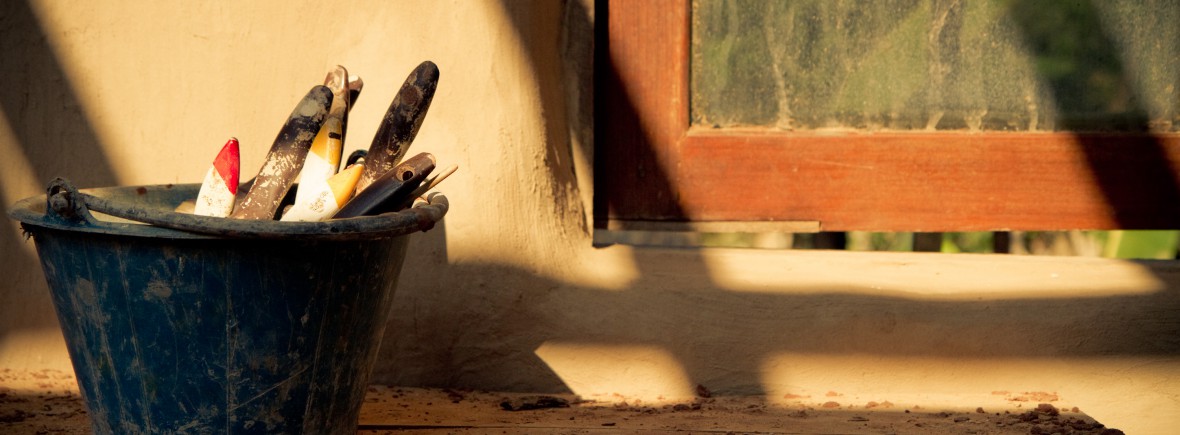|
Compost
|
Effective Micro-organisms (EM)
|
for garden:
Bokashi Compost
Aerobic Bokashi:
Rapid decomposition.
The resources we have most readily available are animal dung, rice husk and rice bran. Other organic matter that can be used are as follows:
Can use rice bran, corn meal, soybean organic material, maneur, corn bran, wheat bran, maize flour, rice husk, bean husk, rice straw, oil cake cotton, seed cake, press mud, bagusse, chopped weeds, sawdust, coconut fiber and husk, crop residues, fruit bunches in oil palm, fish meal, bone meal, dung of any animal, kitchen scraps, seaweed, crab shells, and similar materials.
Can also add: rice husk charcoal, zeolite, kelp, grass, and wood ash. These porous materials improve soil physical conditions and nutrient holding capacity.
Should smell sweet and fermented (with white mold).
To make:
- 2 parts animal dung
- 1 part rice husk
- a little rice bran
Spread this combination in long short rows (around 1 ft high).
Water with:
- 1 part EM (see recipe below)
- 1 part Molasses (can use sugar diluted in hot water but should be strong)
- 100 parts Water
Saturate initially until thorough. If squeeze and water comes out, you have too much water. Water the first day. Cover with bags or straw. Compost will get hot and then come back down. Then it is ready. Takes about 4-5 days.
Take and use on top of garden beds. Don’t let it dry out too much. Use as soon as possible. If can’t use, dry it out and use later. Temperature should be between 35-45 degrees Celsius.
Anaerobic Bokashi:
Put in feed bags and close tightly. Maintains energy (nutrition) of organic matter but takes longer time to decompose and mismanagement can cause spoilage.
Effective Micro-organisms (EM)–(also known as Indigenous Micro-Organisms (IMOs))
Benefits:
- Create hummus by decomposing organic matter
- Improve soil structure—binding, aggregates
- Protects roots from disease and parasites
- Helps retain Nitrogen and other nutrients
- Slowly releases nutrients to plants
- Produces enzymes and hormones that help plants grow and resist stress
- Decompose pollutants that enter soil
- Improve water infiltration and oxygen diffusion
- Enhance foliage
- Provide pest control
Cultivate your own:
- Combine 7 parts water: 1 part sugar/molasses: 3 parts kitchen scraps/flowers. Keep for two weeks in a closed container with non-airtight lid, in a dark and slightly warm place. The higher the protein content of matter, the higher Nitrogen content. This can be used as a general liquid fertilizer for watering plants when diluted 1 cup : 1 watering can.
Natural Pesticide/Repellent:
Mix:
- 600 ml water
- 100 ml molasses
- 100 ml vinegar
- 100 ml distilled spirits
- 100 ml pesticide EM (made like basic recipe but instead of kitchen scraps add chilis, garlic, noni, neem and/or lemongrass)
Ferment anaerobically in capped plastic bottle in warm place. When gas stops, it’s ready. Use within 3 mos
for body:
Banana EM:
The idea of banana EM is to replace the beneficial bacteria in our digestive system as the preservatives we eat in our modern diets kill these in our bodies. As well the minerals in bananas are good at helping to stop diarrhea as well as constipation.
Cut up 3 kg whole unpeeled bananas (was non-organic bananas first) and place in a container with a lid. Add in 1 kg sugar/honey over the bananas. Close the lid but not airtight.
Leave for at least one month and then take one tablespoon morning and evening to help boost immune and digestive systems.
If you are having digestive problems can be taken more often. Dilute one tablespoon in a glass of water and take frequently throughout the day.
